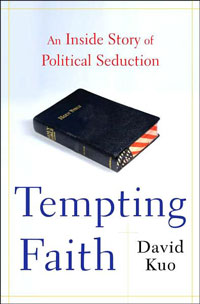Book Notes
 David Kuo, Tempting Faith; An Inside Story of Political Seduction (New York: Free Press, 2006), 283pp.
David Kuo, Tempting Faith; An Inside Story of Political Seduction (New York: Free Press, 2006), 283pp.
In his first presidential campaign George W. Bush promised to spend $8 billion per year in new money to help the poor through faith-based initiatives. As an earnest and talented evangelical Christian, David Kuo was euphoric, and in 2001 he joined the White House staff as a Special Assistant to Bush to help manage the new effort. At long last, he thought, he had found a way to use political means to further Gospel ends. Much to his credit, two years later he resigned when he realized that the Bush administration had done "less than nothing" to fulfill their promises. It was all "a farce, a brazen deception, smear tactics, a mirage." The grant application process was a sham and probably illegal and unconstitutional. Worst of all, he saw how instead of using politics to further the Gospel, his Bush colleagues played right wing evangelicals like a cheap violin to further their political ends, and in private derided them as dupes, nuts, and crazies. Evangelicals, Kuo discovered, were used and abused as an incredibly gullible gold mine of voters (over 80% of them voted for Bush), nothing more and nothing less. "We were good people," he concluded, "forced to run a sad charade, to provide political cover to a White House that needed compassion and religion as political tools."
Kuo has been hammered by Dobson, Colson and other conservative ideologues who cannot bear to admit what he has documented based upon extensive personal experience. I found him evenhanded in his treatment. He calls a spade a spade, gives people the benefit of the doubt, and tends not to judge their motives. He does a good job, for example, showing the flagrant disregard, derision, and breathtaking ignorance on the part of Democrats for people of faith and their concerns (all to their political loss, of course). Talk about out of touch—is it really possible that Terry McAuliffe, former head of the DNC, had no idea who Rick Warren was when he met him at a National Prayer Breakfast (p. 256: "Was it any wonder evangelicals preferred hanging out with Republicans?"). Kuo is hardest on himself. "I let the passion of politics distract me from what matters most in life." In fact, most of his book is a personal memoir about his own awakening to the corrosive environment of political power in which manipulation, fragile egos, broken marriages, propagandistic lies, and partisan ideology are the order of the day. Principled purists with a genuine conscience will pay a heavy price to play this game of pragmatists. For Kuo, a divorce, disillusionment, remarriage, and surgery for a massive brain tumor at the age of thirty-four changed all that, as did his growing realization that for Christians the Gospel should subvert political power, and not vice versa.


